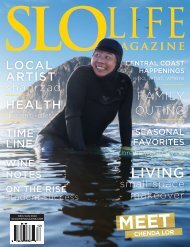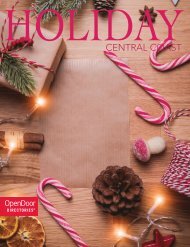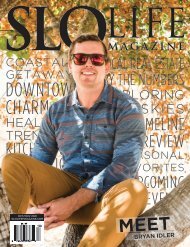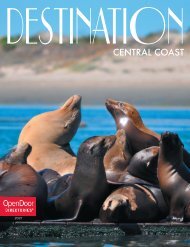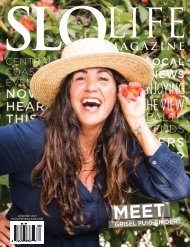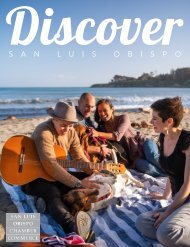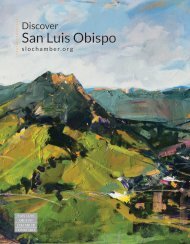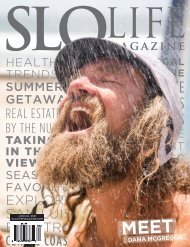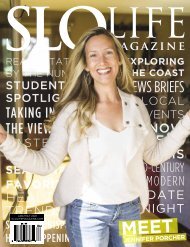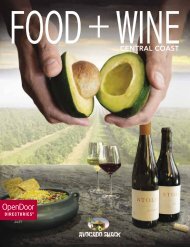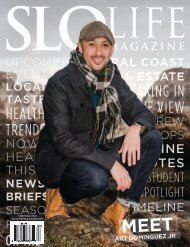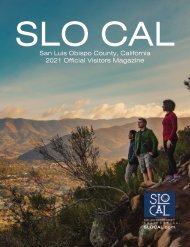Create successful ePaper yourself
Turn your PDF publications into a flip-book with our unique Google optimized e-Paper software.
et’s start from the beginning, Wendy.<br />
Where are you from? I grew up in the<br />
Midwest. I was born in St. Louis, Missouri,<br />
which is where my dad’s family is from, but,<br />
when I was two, we moved to Ohio. My dad<br />
got a job at the college there, actually it’s a<br />
college and a musical conservatory. And, so<br />
that’s where I grew up, in this little town Lof Oberlin—just two miles in diameter—there were about 8,000 people,<br />
and it grew to 11,000 when the students were in town. It was truly an<br />
idyllic upbringing: kids and bikes everywhere, come home by dark, and no<br />
fences between homes, and just a lot of wonderful childhood memories of<br />
growing up in that little place.<br />
What were you like as a kid? I was really into music, and I was verbal, very<br />
verbal. I liked to talk. I liked language. I did well in school. My friends<br />
used to say we were the nerds in the popular crowd. We hung out with<br />
the popular kids, but we were definitely the nerdy ones, the nerdy friends.<br />
Everywhere we went, our bikes were the mode of transportation. I rode<br />
my bike everywhere. Most everyone in Oberlin seemed to love music, a<br />
lot of my friends’ parents taught there also. I played in the youth orchestra,<br />
did musical theatre. I wasn’t the greatest athlete; drama was my thing.<br />
How did your family end up in the Midwest? I’m Jewish, my mother’s<br />
side of the family is Jewish. Her parents escaped the Holocaust when they<br />
left in 1938. My mom is of Austrian descent. She was born in Rochester,<br />
New York two years after they arrived, before they settled in Indiana. My<br />
dad’s side of the family comes from a long line of St. Louis Presbyterians.<br />
By the time I was getting ready to have my own family, I was feeling more<br />
of an affiliation with the Jewish side, just psychically and intellectually, it<br />
was more in line somehow; it just sat better with me. So, when my son had<br />
a bar mitzvah and my daughter had a bat mitzvah a few years ago, both<br />
my parents came out from Boston where they live now. Dad brought Bill,<br />
and my mom brought Peggy.<br />
Wait a second, hold up. Who are Bill and Peggy? [laughter] Okay, this<br />
is where things get a bit complicated. I was in my mid-twenties when my<br />
parents split. They had been married at that point for thirty-three years.<br />
Where the story takes a turn is when they both ended up partnering with<br />
same gender people. My dad, his name is Carl, partnered with Bill. And,<br />
my mom, Mary, ended up with Peggy. For the most part, they get along<br />
really well now, they even go on double dates. I’ll call my dad sometimes<br />
and he’ll say, “I can’t talk right now because Bill and I are heading out to<br />
meet Mary and Peggy for a beer.” Looking back on it now, I think my<br />
mom just had enough of this kind of cloaked secret life with my dad’s<br />
sexual orientation, which was the immediate impetus for her to leave, but<br />
there were other issues, as well.<br />
Did you know all this was happening when you were growing up? For<br />
my sister and me, no. We had no clue. But, I will be in a conversation<br />
with an old friend from high school or something, and I’ll say, “Can you<br />
believe my dad’s gay?” And they’ll say, “Yeah, we all knew it. We all knew<br />
it, Wendy. Why didn’t you know it?” But, the fact that now at eighty years<br />
old, with his health failing him, he’s in many ways, physically very, very<br />
uncomfortable. And, yet, I would venture to say, he’s never been happier.<br />
On some fundamental sort of psychic level, he’s in a loving relationship,<br />
he’s got a great house, he’s got wonderful friends, he feels good about<br />
himself in terms of the life he’s living. So, in moments when I doubt my<br />
own situation or what’s happening in my life, I look at my parents.<br />
How long has your dad been remarried? Dad and Bill only got married six<br />
years ago, but they’d been together maybe four years before that. So, they’ve<br />
been together about ten years now. And, then mom and Peggy, a couple of<br />
years before that, three or four years before that. And, Peggy has a daughter<br />
in San Francisco who is my stepsister. I’ll tell you, the thing that I took<br />
from their experience is that you just never know when you’re going to be<br />
the most happy in your life. Does that make sense? Here’s where we are.<br />
We’re here, right now. I’m not saying it quite right, but the whole thing has<br />
taught me that at any point in your life, something really great can happen<br />
that enriches it in ways that either it was meant to be enriched or you didn’t<br />
expect it would be. So, during all of those younger years, and I do think<br />
that my parents had some pretty wonderful chapters, at least segments of<br />
chapters, but there was always something missing. And, they both found it.<br />
Alright, let’s get back to you, Wendy. What happened after Oberlin?<br />
Okay, yes, I graduated from high school and then went off to college. I<br />
got lucky enough to be accepted at Brown University in Providence. So, I<br />
moved to the East Coast for my college experience. My college years were<br />
spent studying History and Russian. I became a Russian major, which was<br />
somewhat an accident of fate. I picked up a Russian novel in high school,<br />
Crime and Punishment, and it caught my interest. I was quite intrigued by<br />
how brooding and dark and complicated it all was. And, so I thought, “Who<br />
writes a book like this?” I think that, especially during those formative<br />
teenage years, there’s something that happens to us, whether it’s a book or<br />
a film or a trip or something that just captures our imagination. That’s what<br />
happened to me with Dostoyevsky’s book.<br />
What came next for you? So, I headed off to college and started dabbling<br />
in Russian literature classes. Then, I befriended some people in the Russian<br />
department. Finally, I said to myself, “Well, heck, if I want to understand a<br />
little bit more about the sort of psyche of these people in this place, I should<br />
learn the language.” And, this was during the end of the Cold War, so it<br />
also had a little bit of mystique to it. It was dark and dangerous, not at all<br />
like London or France or something. This was the ‘80s, so it was the Iron<br />
Curtain and scary. I did a term abroad in Leningrad, and when I returned<br />
I taught Russian for a year; it was more of an internship, really. Around<br />
that time, there was a huge surge of Russian Jewish immigrants who were<br />
applying for refugee status coming out of the Soviet Union. So, I ended up<br />
moving to Rome to work with a refugee resettlement agency called HIAS.<br />
I became a caseworker there and helped people file their paperwork with<br />
the US Embassy Immigration & Naturalization Service. After a year doing<br />
that work, I went to an exchange program at a physics and math school in<br />
Siberia. I taught English and took care of a group of high school exchange<br />
students. I stayed there, in Novosibirsk, for a year.<br />
Wow, a year in Siberia. Then, I came back, taught for a few more years at<br />
Andover and realized that I wanted to go back to graduate school, but I<br />
didn’t think I wanted to go into Russian. There just weren’t many jobs in<br />
that field. Is this too much detail? I feel like I’m talking too much. So, I<br />
ended up going back to school again. I got really lucky and had a chance to<br />
get a master’s in public administration at Harvard. I was really interested<br />
in the intersection between education and the schools and the community.<br />
After grad school, I worked at an agency in Cambridge, Massachusetts<br />
called Cambridge Community Services. I was the associate director there,<br />
and one of my favorite programs that we ran was called City Links. It was<br />
a program that was in partnership with a high school. The high school<br />
in Cambridge taught a civics government class for kids, who were either<br />
themselves immigrants or children of immigrants. And, in conjunction<br />
with the civics government class, they also got paid internships in city<br />
departments in Cambridge. >><br />
DEC/JAN <strong>2020</strong> | <strong>SLO</strong> <strong>LIFE</strong> MAGAZINE | 43




